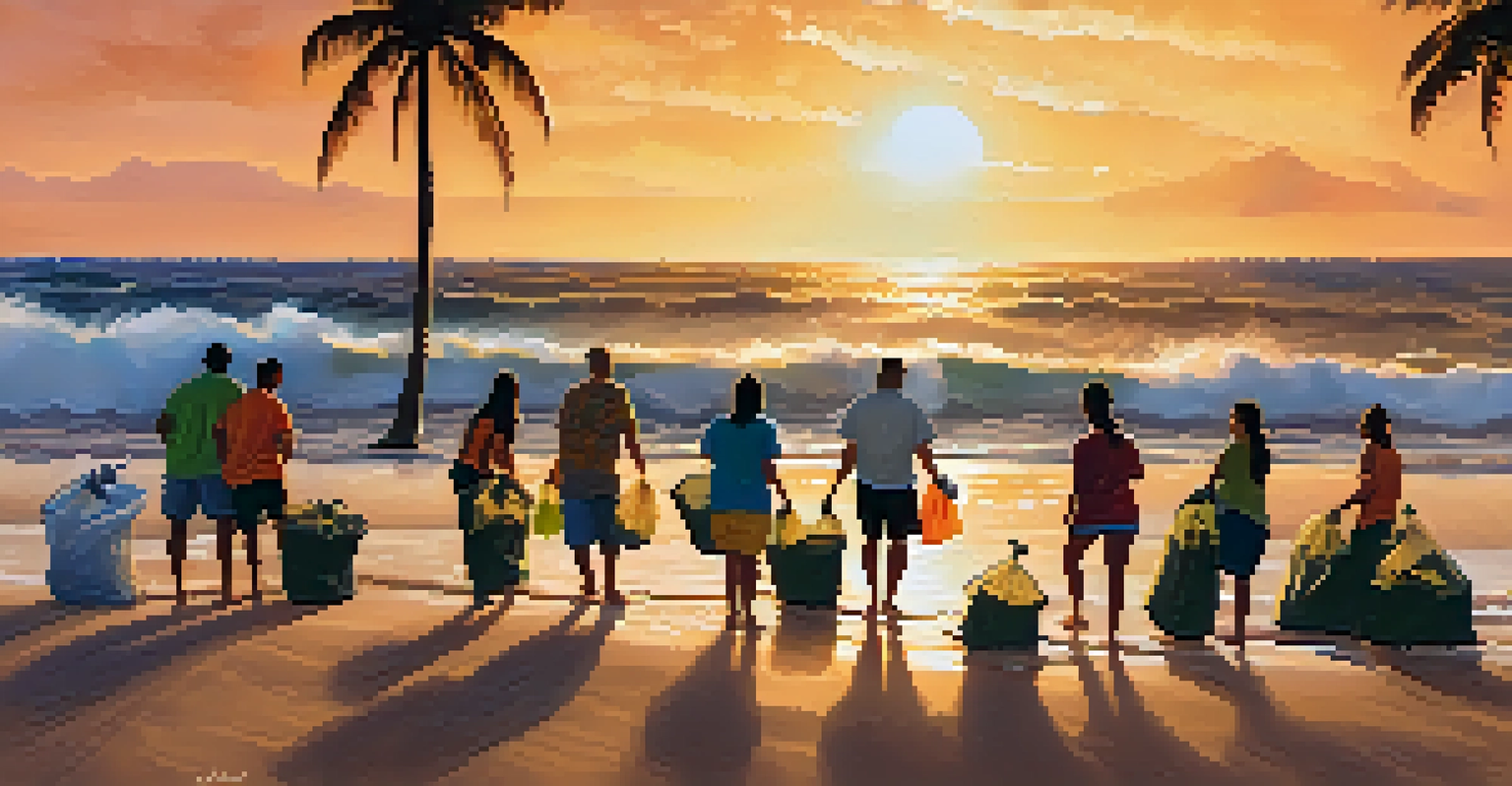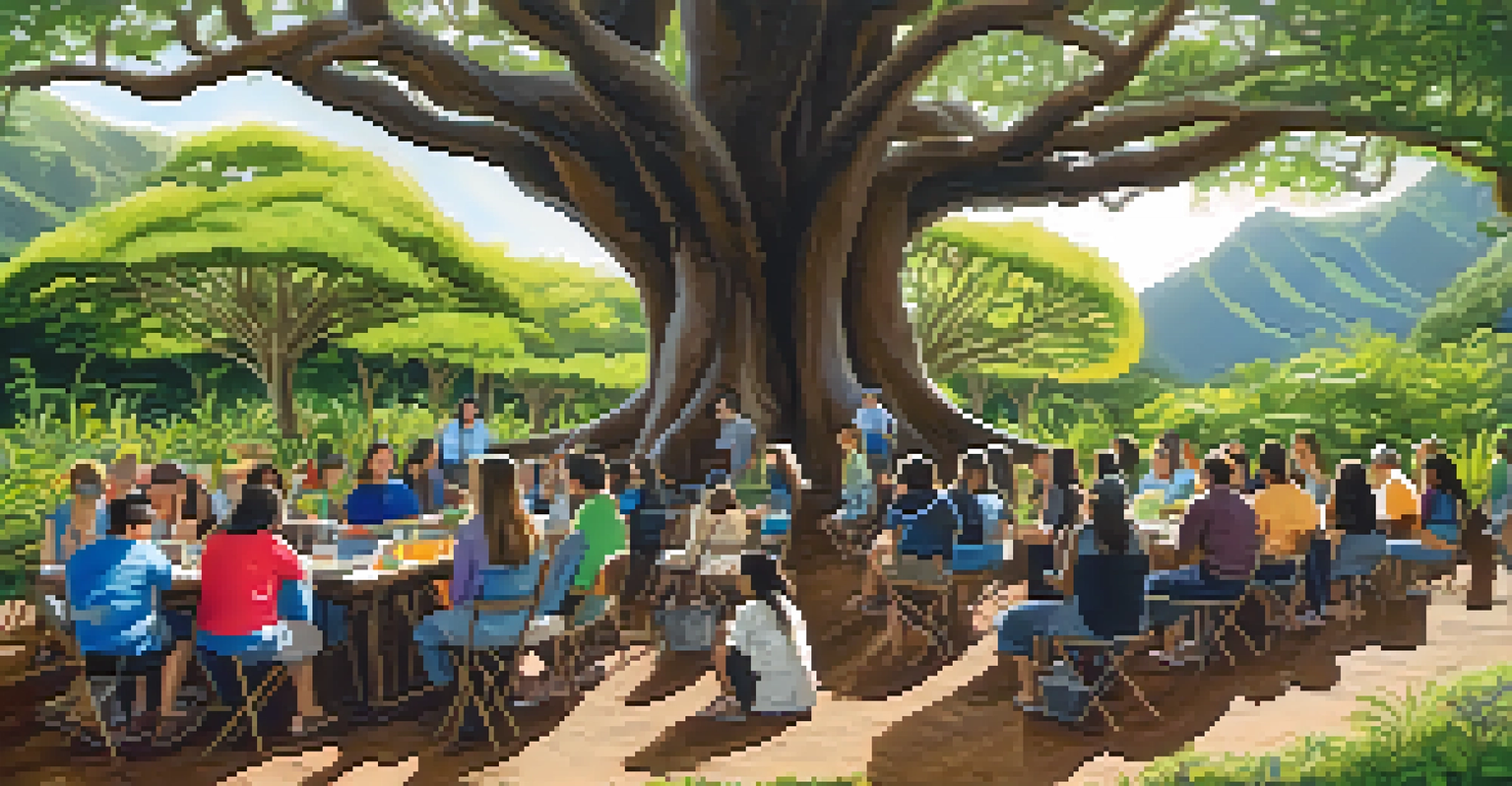Community Initiatives for Sustainable Living in Hawaii

Understanding Sustainability in Hawaii's Unique Environment
Sustainability in Hawaii goes beyond just being eco-friendly; it's about preserving a way of life. The islands, rich in biodiversity and cultural heritage, face unique challenges that demand innovative solutions. Local communities are stepping up to protect their environment while maintaining their traditions.
The environment is where we all meet; where we all have a mutual interest; it is the one thing all of us share.
In Hawaii, sustainability is deeply intertwined with cultural values, where the land ('aina') and sea ('kai') are respected and nurtured. This perspective encourages practices that not only benefit the environment but also strengthen community bonds. It's an approach that recognizes the importance of living in harmony with nature.
By embracing sustainable practices, communities in Hawaii are setting an example for others worldwide. These initiatives often focus on renewable energy, conservation, and local food systems, showcasing how collective efforts can lead to significant change.
Community Gardens: Growing Together for a Greener Future
Community gardens have become a cornerstone of sustainable living in Hawaii, providing fresh produce while fostering connections among residents. These shared spaces not only enhance food security but also promote biodiversity in urban areas. They serve as a hands-on education platform for people of all ages.

In many neighborhoods, community gardens are transforming vacant lots into lush green spaces where families can grow their own food. This initiative encourages people to engage with their environment and learn sustainable gardening practices. Plus, it helps reduce reliance on imported goods, which is crucial for island sustainability.
Sustainability as Cultural Heritage
In Hawaii, sustainability is not just about the environment; it's a vital part of preserving cultural values and community bonds.
The joy of gardening together creates a sense of community and belonging, as people share tips, harvests, and stories. This collaborative spirit is essential for building resilient neighborhoods that prioritize sustainability and food sovereignty.
Renewable Energy Projects: Powering Hawaii's Future Sustainably
Hawaii is leading the way in renewable energy, aiming for 100% clean energy by 2045. Community-driven projects are vital in this transition, with many neighborhoods investing in solar energy systems. These initiatives not only reduce carbon footprints but also lower energy costs for residents.
The greatest threat to our planet is the belief that someone else will save it.
Local organizations are working with residents to make solar energy accessible for everyone. For example, community solar programs allow multiple households to benefit from a single solar installation, creating shared savings and increasing participation. This approach democratizes access to clean energy, ensuring that all voices are heard.
The shift to renewable energy is more than just a technical change; it’s a cultural shift towards valuing sustainability. As communities harness the power of the sun and wind, they’re also fostering a strong sense of environmental stewardship.
Waste Reduction Initiatives: Minimizing Impact on the Islands
Waste reduction is a key focus for many Hawaiian communities striving for sustainability. From composting programs to recycling initiatives, residents are finding creative ways to minimize waste and protect their beautiful landscapes. These efforts are crucial in a place where landfill space is limited.
Local schools and organizations often lead educational campaigns to raise awareness about waste management. By teaching proper recycling techniques and the benefits of composting, they empower individuals to take action in their daily lives. This shift not only reduces waste but also creates a culture of responsibility.
Community Initiatives Drive Change
Local projects such as community gardens and renewable energy efforts showcase how collective action can lead to significant environmental benefits.
Moreover, many communities are embracing 'zero waste' events, where vendors and attendees are encouraged to bring reusable items. This collective effort showcases how small changes in behavior can lead to significant environmental benefits, inspiring other regions to follow suit.
Marine Conservation: Protecting Hawaii's Precious Oceans
Hawaii's oceans are vital to its ecosystem and culture, making marine conservation a top priority for local communities. Initiatives such as beach clean-ups and coral restoration projects engage residents in protecting their coastal environments. These hands-on activities instill a sense of ownership and responsibility toward marine life.
Local organizations often partner with schools to educate students about the importance of healthy oceans. By incorporating marine science into curricula, children learn about the delicate balance of marine ecosystems and the impact of human activities. This knowledge fosters a generation of environmentally conscious citizens.
Through community-led marine conservation efforts, residents are not just safeguarding their waters; they are also preserving their heritage. The ocean is a source of food, recreation, and cultural identity, and protecting it ensures a sustainable future for generations to come.
Eco-Tourism: Promoting Sustainable Travel Practices
Eco-tourism has gained popularity in Hawaii, offering visitors a chance to experience the islands responsibly. Local businesses are increasingly focusing on sustainable practices that minimize environmental impact while showcasing the natural beauty of Hawaii. This trend helps educate tourists on the importance of preserving local ecosystems.
Many eco-tourism initiatives prioritize community involvement, ensuring that local voices are heard in the tourism sector. By supporting local guides and using sustainable resources, travelers contribute directly to the islands' economy while promoting conservation efforts. It's a win-win situation for both visitors and residents.
Education Fosters Environmental Stewardship
Workshops and school programs are essential in teaching residents and children about sustainable living, ensuring a future generation committed to environmental care.
As more travelers seek authentic experiences, eco-tourism is poised to play a significant role in Hawaii's future. By embracing sustainable practices, the islands can protect their unique landscapes while sharing their culture and natural wonders with the world.
Collaborative Workshops: Sharing Knowledge for Sustainable Living
Workshops focused on sustainable living are popping up across Hawaii, bringing community members together to share knowledge and skills. These gatherings often cover topics like permaculture, waste reduction, and renewable energy. By learning from each other, residents can implement sustainable practices in their own lives.
Local experts and enthusiasts frequently lead these workshops, creating a rich exchange of ideas and experiences. Participants gain practical skills, such as how to create a rain garden or compost effectively, which they can easily replicate at home. This hands-on approach fosters a deeper understanding of sustainability.

Moreover, these workshops help build a strong sense of community as people connect over shared goals. By working together, residents can cultivate a culture of sustainability that extends beyond individual efforts, making a lasting impact on the islands.
The Future of Sustainable Living in Hawaii: A Collective Journey
The future of sustainable living in Hawaii relies on the collective efforts of communities, individuals, and organizations. As awareness grows, more residents are embracing sustainable practices that protect the islands' unique environment. This movement is about creating a legacy for future generations, ensuring that Hawaii remains a vibrant and healthy place to live.
Collaboration is key in this journey, with diverse groups coming together to share resources, knowledge, and support. By fostering partnerships between environmental organizations, local businesses, and government agencies, Hawaii can address sustainability challenges more effectively. This united approach amplifies the impact of each initiative.
As communities continue to innovate and adapt, the spirit of sustainability will thrive in Hawaii. By nurturing a culture of care for the environment, residents can ensure that the islands remain a paradise for both locals and visitors alike.